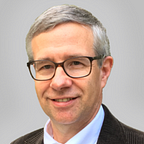Who Defends Loudly The Rule of Law
We need leaders with voices who will use them in time of need
The world seems to be at many crossroads as countries sort out how they will address the ascendency of populism and its creeping takeover of globalization. The conference in Davos presented a unique opportunity to hear how many feel about the rule of law, which is why you see some of my posts focusing on it. For example, the United States has signaled its shift from global leader to “America first but open for business,” leaving the center stage open for other countries to seize the leadership role. At last year’s Davos, China stepped forward. This year, it was French President Macron.
Change on a global scale is not for the lighthearted. It would seem caution would be useful and, as I have counseled elsewhere, a healthy dose of understanding how we got to where we are — the foundations of civilization. Jaques Barzun is particularly helpful in this regard, though not alone.
The big stage at Davos gives leaders the opportunity to make grand statements. It was surprising to see President Macron use the stage to take a step back from the rule of law in France:
Macron defined acceleration and flexibility in terms of realigning France “on Germany and Northern Europe”, shifting from “rules defined by law” towards rules “defined by consensus” and by reducing total costs associated with energy, housing and transport to make the French economy more nimble and responsive.
To be fair, he had just weeks before emphasized how we must commit to and respect the rule of law when talking about how countries must unite in their fight against terrorism.
I understand rules defined by law, but rules defined by consensus is, at least in his mind, something different. Yet, if the consensus has been defined, is the only gap the codification of the consensus? Or, is it somehow less or different than law?
The fundamental notion of rule of law is that law transcends man. This notion gives us comfort. Whatever happens, man is held accountable to the law. So, does President Macron mean man is now held accountable to consensus?
I have been told the rule of law extends beyond these moments. Whatever President Macron may say for popular consumption, the rule of law will hum along in the background. In other words, politics will not displace a sound rule of law system in France.
True enough. President Macron’s statement aside, France is not about to convert from its current legal system to a new one based on the notion of “rule of consensus.” And yet to argue that is to trivialize the point.
The rule of law should be the bedrock on which each rule of law country shares with each other rule of law country an unwavering belief that rule of law is what unites them. As you move from country to country, that unity gives you comfort and it acts as a backbone for the countries involved, stiffening their resolve to fight against the absence of law.
When we permit the supremacy of the rule of law to be challenged, we (and here I am looking at lawyers) step away from the one thing that is uniquely ours to defend. If we as lawyers cannot speak loudly in defense of the rule of law, then what is our mission, our reason for existing apart from being knowledgable guides through technical worlds?
Each time I hear an attack on the rule of law without a response, I cringe. I turn to those who claim leadership in the profession — deans of law schools, law firm leaders — and I hear silence. Leadership without a voice in the face of such attacks on a core notion of our profession suggests strongly the absence of leadership and the arrival of figureheads. Speaking out at such times is complicated and involves risk. And yet speaking out at such times when there is risk defines leadership.
In their book, The Future of the Professions, Richard and Daniel Susskind search for a satisfactory definition of a profession. Ultimately, they deliver a not-very-satisfactory response. In a future post I’ll share some thoughts about where they missed. In the meantime, we gather more data about what lawyers do (@PlaceJudicata), we see gaps between what a profession would do (speak up for the rule of law) and what our profession does (remain largely silent), and we ponder our role in society
I spend much of my time talking and writing about how to improve what we do. Improvement requires a willingness to move forward and some semblance of goals. This year’s crop of surveys, reports, and predictions from experts suggest those in the profession of lawyers (as opposed to those many who have come into the legal industry without the privilege or baggage of being a lawyer) have ambivalence about the profession’s future. I think the profession has a very bright future, and that this could be the tipping point for the profession to rise above its recent bout of intense capitalism. I hope there are others who share that view and will give it a voice.
